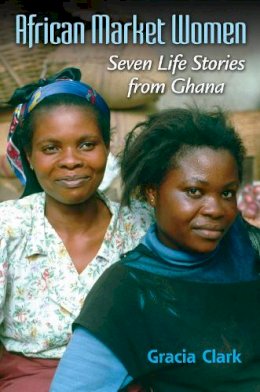Gracia Clark is Associate Professor of Anthropology at Indiana University Bloomington. She is author of Onions Are My Husband: Survival and Accumulation by West African Market Women and has edited several volumes dealing with gender and economic life in West Africa.
"Clark (Indiana Univ.), an experienced fieldworker and expert on Ghanaian market women who has done research in Kumasi since 1978, offers intriguing insights into the lives of seven Akan women traders. This life history project, begun in 1994, is a tribute to long-term research where informants and researcher are familiar with and trust each other. Clark's previous work has emphasized women's economic activities and the family relations supporting them. The narratives here reflect those issues and add religion and change as important themes. Throughout, the respondents feel free to offer moral advice to the anthropologist. Directly quoted life histories, ranging from 14 to 29 pages, constitute the majority of the book. Brief prefatory statements about the respondents precede each chapter. All narratives were recorded and informants' editorial suggestions were sought. While the women are approximately the same age and share nationality, ethnicity, and occupation, the individual perspectives that emerge speak to the heterogeneity of their experiences. The introduction and conclusion contain essential background information and analysis. There is spare use of explanatory footnotes; helpful maps and photos are included. Summing Up: Recommended. Upper-division undergraduates and above. — Choice"—R. Ellovich, North Carolina State University, Jan. 2011 "Clark . . . offers intriguing insights into the lives of seven Akan women traders. . . . Recommended."—Choice "Overall, this is an excellent book: it will be useful in undergraduate teaching and makes an important contribution to our understanding of the richness and variety of women's lives in West Africa."—Journal of Africa "Shows, in direct speech, how family, kinship, marriage and age/generation work together in a daily life which is shaped by political, demographic, cultural, and wholly accidental change in people's circumstances."—Jane Guyer, Johns Hopkins University "[This] book may be read as both a scholarly study and a collection of primary sources: accessible to a general reader, and likely to be of particular interest to students and scholars seeking knowledge about Ghana, women's studies, and/or African social history and economic life. For readers who are already familiar with Clark's first book, African Market Women will be a welcome and rewarding companion volume. July, 2010"—H-Africa, H-Net Reviews "African Market Women is a wonderfully evocative compilation of seven life histories from Kumasi, Ghana, of women Gracia Clark encountered in the course of a lifetime of fieldwork with marketers and study of the anthropology of marketing.April 2012"—African Studies Review "African Market Women provides a unique insider's view into the highly complicated workings of the West African commodities trade. Through the words of some of the market's most accomplished veterans, readers can see the daily efforts involved in distribution and marketing of some of Ghana's most essential household items.Vol. 43, no. 2, 2010"—Intl Jrnl. of African Historical Studies "Provides rich and nuanced insight into a range of themes which are at the very heart of late colonial and postcolonial scholarship on Africa: globalization, gender and economic security, economic decline, structural adjustment, changes in family structure, urbanization, environmental degradation, new forms of spirituality, transnational migration, and the politics of memory."—Jean Allman, Washington University

